Resin-bound gravel walkways last 10-25 years, with premium installations reaching up to 30 years. Much like a garden patio, their durability depends heavily on British weather conditions and proper maintenance. Think of it as an investment similar to a quality driveway – using first-rate materials and carrying out regular checks will significantly extend its life. A well-maintained resin path can withstand decades of British winters whilst keeping its smart appearance, provided it’s installed by a qualified contractor and given occasional TLC.
Key Takeaways
Resin-bound gravel paths offer impressive longevity, lasting 10-25 years when properly laid and maintained. Think of them like a good kitchen floor – with quality materials and care, they’ll serve you well for decades.
Premium materials can stretch lifespan to 30 years, whilst cheaper options might only manage 5-8 years, particularly in Britain’s varied weather. It’s rather like choosing between budget and quality trainers – the initial investment pays off.
Essential maintenance is straightforward:
- Check for wear twice yearly
- Regular sweeping and cleaning
- Keep heavy vehicles off the surface
Most paths handle daily foot traffic brilliantly for 15-20 years – perfect for garden paths, driveways and school walkways. For best results, source materials from established UK suppliers who meet British Standards. Whilst costlier upfront, quality materials prove more cost-effective over time.
Average Lifespan of Resin-Bound Gravel Walkways
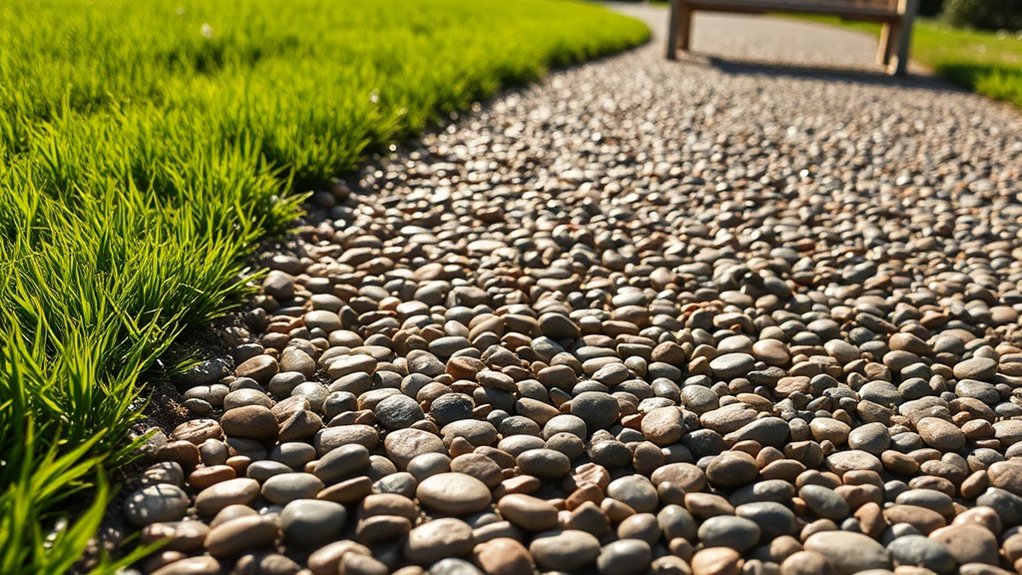
Resin-bound gravel walkways typically last between 10 to 25 years with proper installation and maintenance. Premium resin types can stretch this to 30 years, whilst poor-quality materials might only manage 5-8 years, particularly in harsh weather conditions. Regular maintenance, such as routine checks every six months, is essential to ensure stunning aesthetics and durability.
For typical home pathways, expect 8-15 years of reliable service. The key to maximising your walkway’s lifespan lies in professional installation and regular maintenance. This means resealing every few years and fixing any small cracks or damage straight away – much like looking after your car’s paintwork to prevent rust. High-quality resin and aggregates are essential for durability and longevity.
Quality matters enormously; investing in better materials upfront, similar to choosing a good set of house windows, often proves more cost-effective over time. Heavy foot traffic, extreme weather and improper installation can significantly reduce your path’s durability, so it’s worth getting it right from the start.
Quality of Materials
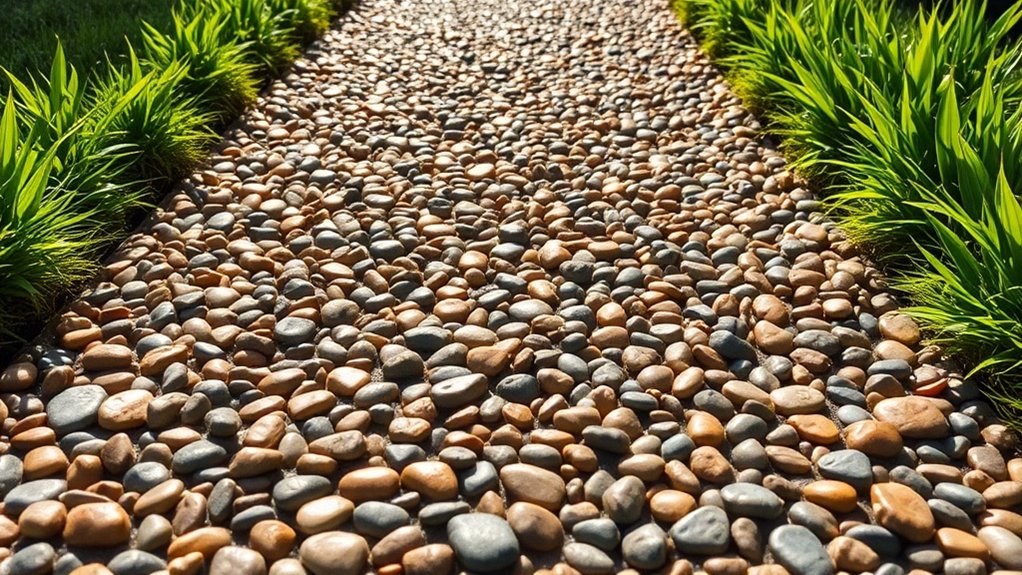
Quality of Materials
Top-grade materials are vital for a lasting resin-bound gravel path. Choose UV-resistant resins that won’t yellow or crack in British weather, paired with proper aggregates that won’t loosen over time. A mix of local stone chippings often works best, offering both grip and visual appeal. While premium materials cost more upfront, they’ll save money by reducing repairs and maintaining their look far longer than cheaper alternatives. Additionally, using high-quality aggregates can significantly enhance the durability and aesthetic appeal of the surface. Furthermore, sourcing materials from trusted UK suppliers ensures consistent quality and compliance with British Standards, further extending the lifespan of your walkway.
Premium Resin Benefits
Premium resin solutions deliver outstanding durability for resin-bound gravel paths and driveways. These materials outshine traditional concrete and tarmac, offering better wear resistance and flexibility. The smooth, seamless finish prevents chipping and erosion, typically lasting 15-20 years with proper installation. Moreover, these surfaces are designed to be highly resistant to weather conditions, handling British weather brilliantly – from winter frost to summer sun – and their permeable nature means excellent drainage, reducing puddles and water damage. Additionally, the long-lasting performance of resin-bound gravel makes it a cost-effective investment for garden pathways.
Unlike standard driveways that need regular upkeep, premium resin surfaces require minimal maintenance, saving time and money on repairs. Choose from various colours and finishes to match your property’s style whilst enjoying a safe, stable surface that stays looking smart for years. Popular choices include neutral tones like bronze and grey, which complement both modern and traditional homes across the UK.
Aggregate Quality Importance
Quality aggregates are essential for a lasting resin-bound gravel walkway. Choose high-density, hard-wearing stones that can withstand British weather conditions.
Think of aggregates like building blocks – they need to be clean and dry to bond properly with the resin, much like how damp bricks wouldn’t work well with mortar.
Getting the right particle size is crucial – imagine trying to build a wall with stones of wildly different sizes. The aggregate mix should be consistent, free from dirt and debris, and meet UK manufacturing standards.
Natural stone aggregates not only look better but also spread weight more effectively across your path.
Good aggregate selection prevents common problems like surface cracking and loose patches, ensuring your walkway stays solid and smart-looking for years to come.
UV Resistance Features
UV-resistant resin-bound gravel walkways offer lasting protection against Britain’s varied weather conditions.
The key lies in UV-stable resins containing special additives that block harmful sunlight, much like a quality sun cream for your path. These additives prevent the resin from breaking down or turning yellow, keeping it clear and strong.
For best results, aliphatic polyurethanes are the top choice – they’re flexible and handle sun exposure brilliantly, perfect for our outdoor spaces.
By investing in quality UV-stabilised resin systems, you’ll get better bonding strength and spend less time on upkeep. Think of it as a protective shield that keeps your walkway looking fresh and well-maintained, whether it’s facing the summer sun or winter elements.
The right UV protection means your path won’t fade or deteriorate, maintaining its smart appearance throughout the seasons.
It’s particularly important for exposed areas like garden paths and driveways where the sun hits directly.
Installation Factors
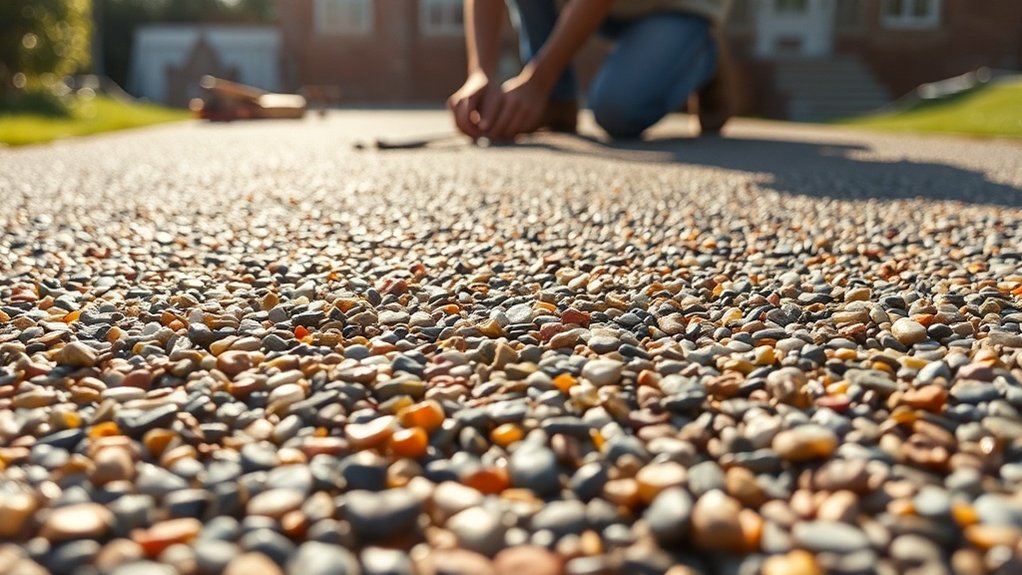
Essential installation factors ensure resin-bound gravel surfaces last and perform well.
Before starting, check drainage and confirm the finished surface sits 150mm below your home’s damp proof course.
For proper installation, dig down 270mm and build a strong foundation using 150mm of compacted Type 1 MOT limestone, followed by 100mm of C35 concrete for driveways – much like building a solid house foundation.
Mix UV-stable resin with clean stones for good grip, similar to making sure you’ve got proper walking boots for hiking.
Work in dry weather and use suitable primers on existing surfaces to ensure everything bonds properly.
Think of primers as the glue that holds your DIY project together – skip it, and things might fall apart later.
Environmental and Weather Impacts

Environmental and Weather Factors for Resin-Bound Gravel
British weather poses unique challenges for resin-bound gravel installations. Four key factors affect your path’s durability:
- Freeze-thaw cycles: Winter temperature swings cause surface cracks – much like potholes in tarmac. These gaps let water seep in, leading to further damage.
- Heavy rainfall: Typical British downpours can gradually wear away the resin binding. Think of it like rainwater eroding soil – constant exposure weakens the surface.
- High humidity: Our damp climate means moisture gets trapped in the surface. This creates perfect conditions for moss and algae growth, whilst weakening the resin’s grip.
- UV exposure: Even in cloudy Britain, UV rays break down resin over time. The surface becomes brittle and fades, similar to how plastic garden furniture deteriorates outdoors.
Maintenance Requirements
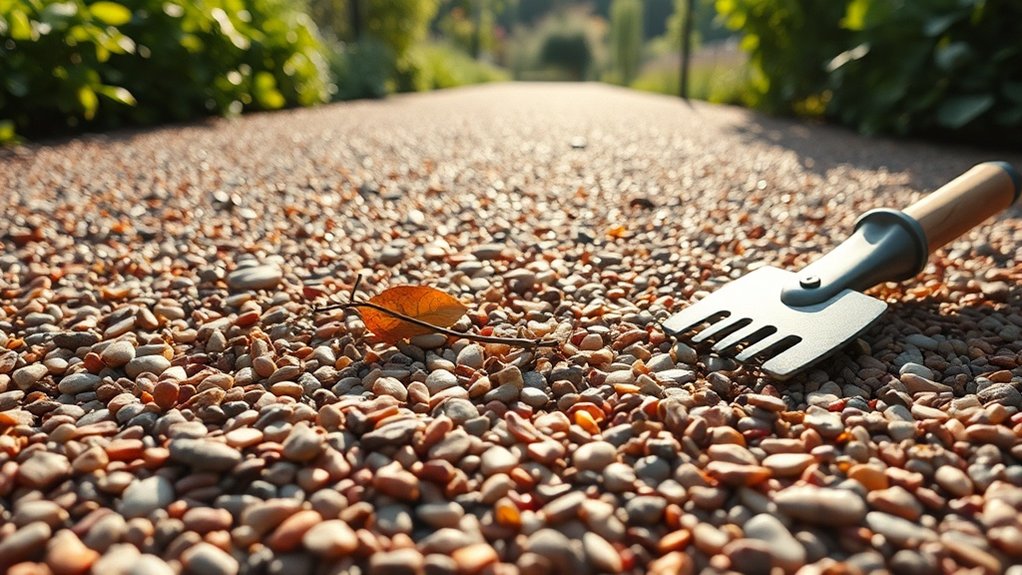
Regular care of your resin-bound gravel pathway is vital for its upkeep and looks.
Sweep weekly with a stiff brush to clear debris and stop stains setting in. Once a year, give it a good clean with a hose or gentle pressure washer – stick to cold water and keep the nozzle 20 cm away from the surface.
For weeds, treat the area when first installed and pull out any that pop up later by hand.
Check often and avoid harsh weed killers that might harm the resin. Clean thoroughly each season to stop moss and algae taking hold.
Before winter hits, look for any cracks and seal them to prevent frost damage.
Usage and Load Considerations
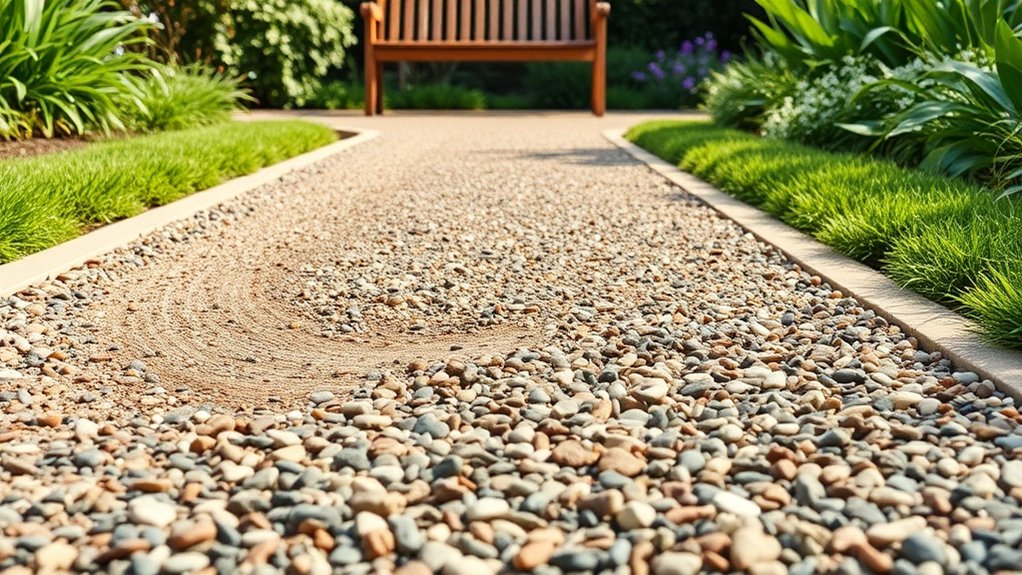
Regular foot traffic poses no issues for resin-bound gravel paths, but heavy vehicles can damage the surface considerably.
For best results, restrict vehicle access where possible – even small delivery vans can reduce your path’s lifespan by several years.
Consider adding bollards or planters if vehicles regularly attempt access.
A well-maintained, vehicle-free path should last 15-20 years with proper care.
Foot Traffic Durability
Foot Traffic Durability
Resin-bound gravel paths stand up brilliantly to daily foot traffic, thanks to their tough construction and smart design. The surface handles everything from morning joggers to weekend crowds without breaking down.
Essential durability features:
- Crack-resistant: The resin and stone mix stays strong under heavy footfall.
- Slip-resistant: Naturally grippy surface keeps people steady, even in British rain.
- Even load spread: Weight from foot traffic gets distributed properly, preventing worn patches.
- Weather-ready: Water drains straight through, stopping puddles and protecting the surface.
Perfect for busy areas like shopping centres, school paths and public walkways, these surfaces keep working year after year with little fuss.
Regular sweeping and occasional pressure washing are all that’s needed to maintain them.
Vehicle Load Impact
Vehicle loads on resin-bound gravel surfaces need careful consideration.
When properly laid, these surfaces can handle vehicles up to 7.5 tonnes. The key is getting the resin depth right – ideally 15 to 18mm – to spread the weight effectively.
A solid sub-base of concrete or asphalt is crucial to prevent sinking or damage. While everyday cars and vans won’t cause issues, lorries need extra reinforcement underneath.
Watch out for vehicles left standing in one spot, as this can lead to dips in the surface.
Regular upkeep and correct installation ensure your resin-bound surface stays strong under vehicle traffic.
Think of it like a car park surface – it needs the right foundation to handle daily use without breaking down.
Comparison With Alternative Surfaces
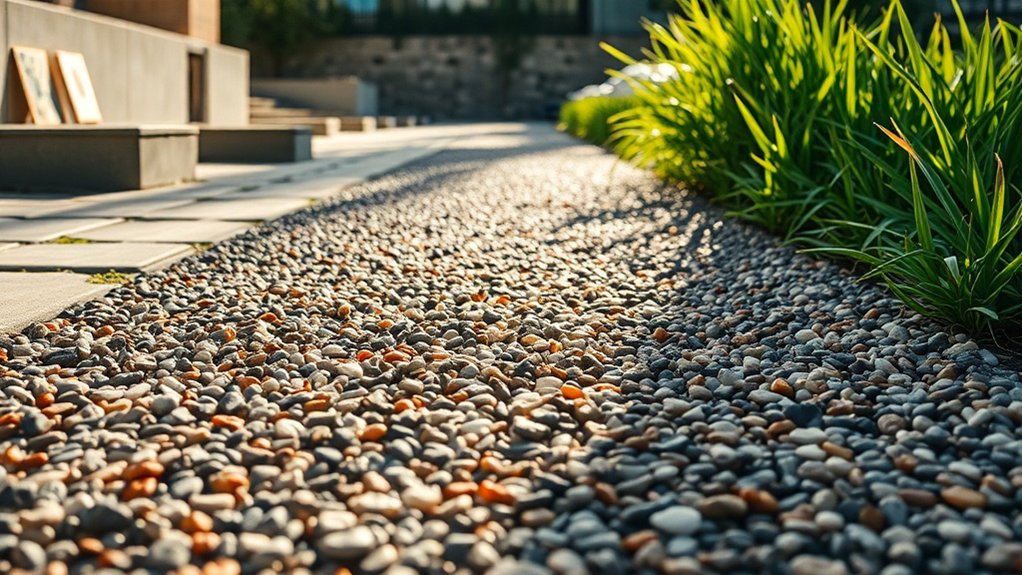
Resin-bound gravel surfaces outperform traditional alternatives for both durability and style:
- Block paving: Whilst lasting up to 25 years, it’s prone to weeds and shifting blocks that destabilise the surface.
- Tarmac driveways: Most endure 15-20 years but crack easily in British weather, often needing unsightly patches.
- Loose gravel: Short lifespan of 5-10 years, with stones regularly scattering and poor drainage in wet conditions.
- Resin-bound gravel: Delivers 15-30 years of service, stands up to UK weather and prevents water pooling.
Resin-bound gravel proves a smart investment, combining modern kerb appeal with robust performance and minimal upkeep.
Importance of Regular Inspections
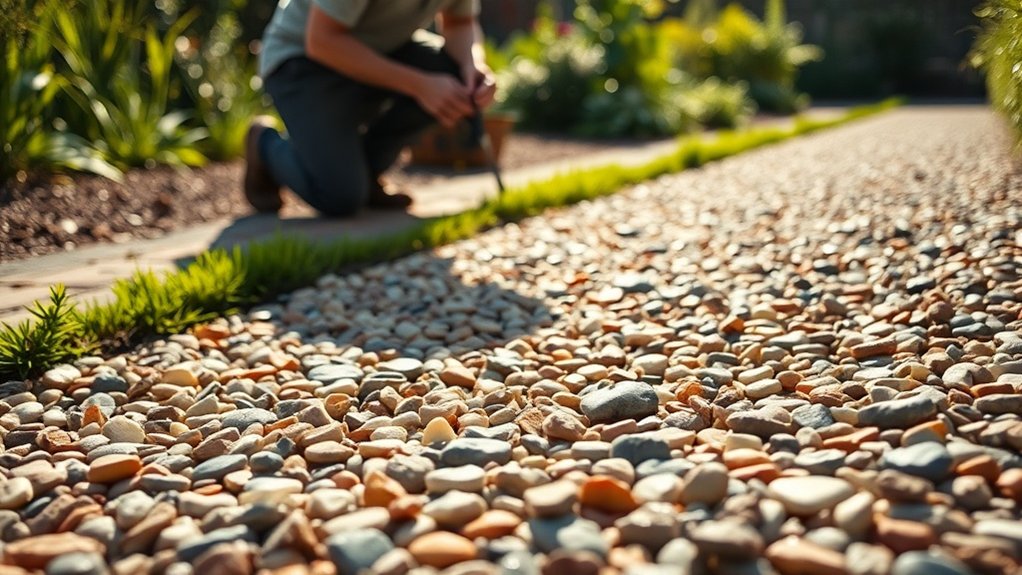
Regular inspections are vital to keep your resin-bound gravel paths in top condition, helping spot problems before they worsen. A proper inspection schedule ensures you maintain quality and catch damage early.
| Inspection Aspect | Frequency | Tools/Techniques |
|---|---|---|
| Visual Inspections | Every 6-12 months | Torch or daylight for crack checks |
| Post-Weather Check | After storms or frost | Damp meter |
| High-Traffic Areas | More frequent checks | Aerial photography |
| Stain Management | During routine checks | Basic cleaning kit |
| Resealing Checks | Every 5 years | Surface gauge |
Think of your path like a car – regular MOTs keep it running smoothly. For best results, check busy areas like garden entrances more often, and always inspect after harsh weather. A quick look every few months can save costly repairs down the line.
Extending the Lifespan of Your Walkway
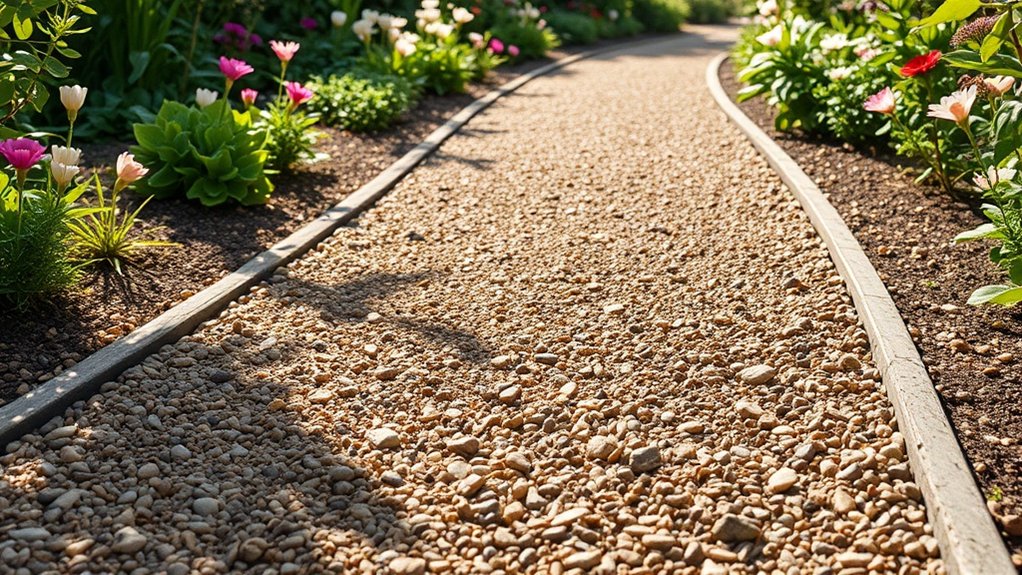
Essential Tips for a Longer-Lasting Walkway
Four key factors ensure your walkway stands the test of time:
1. Colour Choice: Pick UV-resistant resins to stop your path from fading in the British sun.
2. Surface Grip: Use natural stone chips rather than smooth pebbles – they’ll give better grip and wear more evenly, much like a proper garden path.
3. Professional Laying: Get the foundations right with proper base compacting and spot-on resin mixing.
Think of it like building a house – the groundwork matters most.
4. Regular Upkeep: Sweep off leaves and debris when needed, and add a fresh seal coat every 3-5 years.
It’s like giving your car a service – little and often keeps things running smoothly.
Frequently Asked Questions
Can Resin-Bound Gravel Be Used for Driveways?
Resin-bound gravel works brilliantly for driveways across the UK. Think of it as a tough, permeable surface that lets rainwater drain through whilst staying firm under cars and foot traffic. The key is proper installation – you’ll need a solid sub-base, much like a traditional gravel drive but with the added stability of resin holding everything together. It’s particularly suited to our British weather, handling both summer heat and winter frost without breaking up.
What Colors Are Available for Resin-Bound Gravel?
Resin-bound gravel comes in a wide range of colours, from classic Harvest Gold and Riviera to modern greys. These options let you create distinctive paths and driveways that complement your property’s look. The colour selection helps you match your existing garden design or house exterior whilst maintaining a smart, durable finish.
Is Resin-Bound Gravel Suitable for DIY Installation?
Resin-bound gravel can be installed by DIY enthusiasts, though it requires careful attention to detail. Think of it like laying a cake mixture – timing and proper mixing are crucial. You’ll need to properly prepare your base (much like priming a wall before painting), mix the resin and aggregate precisely, and work quickly before the mixture sets. Whilst doable, first-timers might want to start with a smaller project, such as a garden path, rather than tackling a full driveway straightaway.
How Does Resin-Bound Gravel Handle High Temperatures?
Resin-bound gravel performs well in high temperatures, maintaining its structure even during hot British summers. The material resists heat expansion effectively, preventing common issues like softening or warping that can affect other surfaces. Whether it’s a garden path or driveway, the surface stays firm and visually appealing throughout temperature changes – particularly useful for those south-facing areas that catch the most sun.
Are There Any Specific Cleaning Products Recommended?
Use pH-neutral cleaners or mild soap solutions for your resin-bound gravel path. A standard household detergent works well for regular cleaning. Simply brush with a soft-bristled broom and rinse with a garden hose or low-pressure washer. For stubborn marks, a specialised patio cleaner from your local DIY shop will do the trick.
Conclusion
Resin-bound gravel walkways typically last 10-25 years, with proper maintenance being crucial to their longevity. Recent UK studies suggest that regular upkeep can extend their life by up to 30%. Much like caring for your garden path or driveway, simple steps like sweeping away debris and checking for cracks will keep your walkway in top condition. Sort out any damage quickly, and you’ll maintain both the walkway’s strength and its smart appearance for decades.
